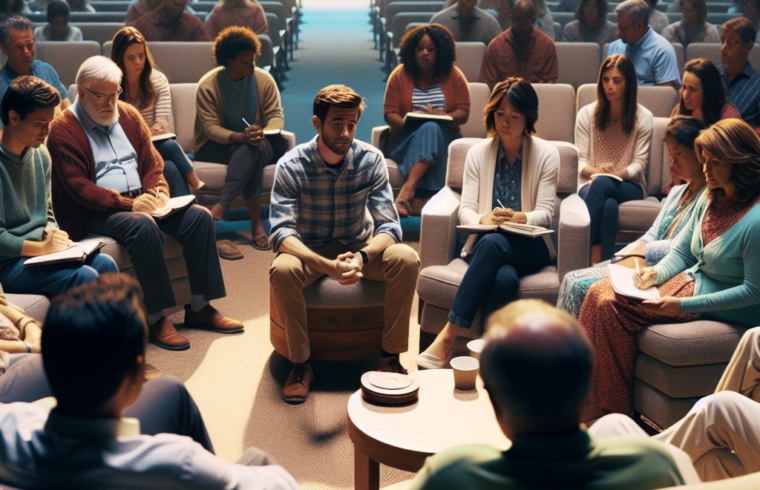==> Thank you for reading this post! Click Here If you are looking for support and Victory over PTSD.
Understanding PTSD through a Christian Lens
The Nature of PTSD
PTSD, or Post-Traumatic Stress Disorder, can be a heavy burden to carry. From my own experience, it’s essential to first grasp what PTSD really is. It’s not just about flashbacks or nightmares; it manifests in various ways, affecting daily life and relationships. Recognizing these symptoms is the first step towards healing.
I’ve found that diving into scripture can provide a sense of understanding and connection. The biblical stories often show struggle and pain, and through these narratives, I’ve realized that I’m not alone in my suffering. They illustrate God’s presence even in the darkest times. Knowing that helps me feel less isolated.
Understanding PTSD within a Christian framework allows for a holistic approach to healing. It’s not just about mental health but also about spiritual growth. I encourage everyone to seek His wisdom in their journey. It has made a profound impact on my recovery process.
Building a Supportive Community
The Importance of Fellowship
One of the most liberating things I’ve discovered is how crucial it is to be part of a supportive community. Fellowship in church or support groups can provide a safe haven for those dealing with PTSD. Sharing stories, hearing others’ experiences, and finding common ground can foster healing.
In my journey, I’ve had friends who walked alongside me, offering prayers and empathy. It’s amazing how shared faith can uplift spirits and provide strength. The sense of belonging makes a significant difference in battling feelings of isolation that PTSD often brings.
A strong community encourages accountability and continual growth. It’s not just about receiving support, but also about giving it. I believe that uplifting others reflects Christ’s love and can help us all heal together as a community.
Faith-Based Therapy Options
Integrating Scripture in Therapy
Exploring faith-based therapy has been another cornerstone in my recovery. These therapeutic options incorporate biblical principles and teachings, making it easier to connect spiritual and emotional healing. Therapists who understand both mental health and faith can provide tailored strategies that resonate deeply with our experiences.
I remember my first session with a faith-based counselor. We discussed not only my trauma but also how biblical stories relate to my healing process. It was like shining a light in a dark room—I began to understand how my faith could guide me through challenging moments.
Moreover, incorporating scripture into therapy sessions offers comfort and guidance. I often left feeling empowered with new tools and insights. It’s a beautiful blend of psychological and spiritual guidance that resonates on multiple levels.
Engaging in Prayer and Meditation
The Power of Prayer in Healing
Prayer is at the heart of my relationship with God and has played a critical role in my PTSD journey. Expressing my pain to God through prayer has been a therapeutic release. There’s something incredibly freeing about laying my burdens at His feet, knowing He’s listening.
Get Support and Help with Recovery! Visit us for more Information and Support
I also discovered that structured prayer, like the ACTS model (Adoration, Confession, Thanksgiving, Supplication) helps bring order to my thoughts. It channels my focus from anxiety to gratitude and peace. This has made a significant impact on how I approach each day and the challenges it brings.
Furthermore, encompassing meditation, particularly on the Word, allows me to internalize God’s promises. Reflecting on scriptures brings me solace and strength, ensuring that I remain grounded during turbulent times.
Embracing Personal Growth through Service
Finding Purpose in Helping Others
One aspect of my healing that surprised me was finding purpose in serving others. Engaging in service not only helps those in need but also cultivates personal growth. It draws my attention away from my struggles and allows me to focus on making a difference in others’ lives.
Volunteering for church activities or community outreach programs showed me the power of contributing to something bigger than myself. It reminded me that we all have a role to play in God’s mission, and this sense of purpose has been remarkably healing.
I encourage anyone dealing with PTSD to consider service as a means of healing. It doesn’t just aid the recipients; it fosters a deeper connection to our faith and helps us see the beauty in our journey, despite the scars. Plus, the friendships formed through service are often some of the richest and most meaningful.
FAQs
1. What is PTSD and how does it affect people?
PTSD is a mental health condition triggered by experiencing or witnessing a traumatic event. It affects individuals by causing symptoms like flashbacks, severe anxiety, and uncontrollable thoughts about the event. It often impacts daily life and relationships significantly.
2. How can a Christian community help someone with PTSD?
A Christian community can provide a supportive environment where individuals feel safe sharing their struggles. It offers fellowship, prayer support, and a sense of belonging. The shared faith can uplift and encourage those healing.
3. Are there therapy options that integrate faith?
Yes! Many therapists specialize in integrating faith-based principles into their practice. These therapists use scripture and Christian teachings alongside psychological techniques, offering a holistic approach to mental health.
4. How important is prayer in the recovery process?
Prayer can be a powerful tool for recovery. It allows individuals to express their pain and seek comfort from God. Structured prayer can also help bring clarity and focus during difficult times, aiding in emotional resilience.
5. Why is serving others beneficial for those with PTSD?
Serving others can help shift focus away from personal struggles and foster a sense of purpose. It encourages connection with the community and increases feelings of fulfillment and happiness, aiding in the healing process. Plus, it’s a way to share God’s love with others.











